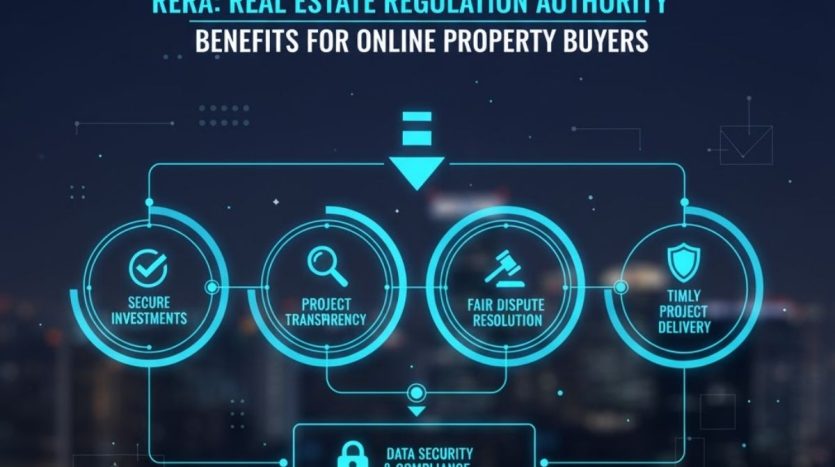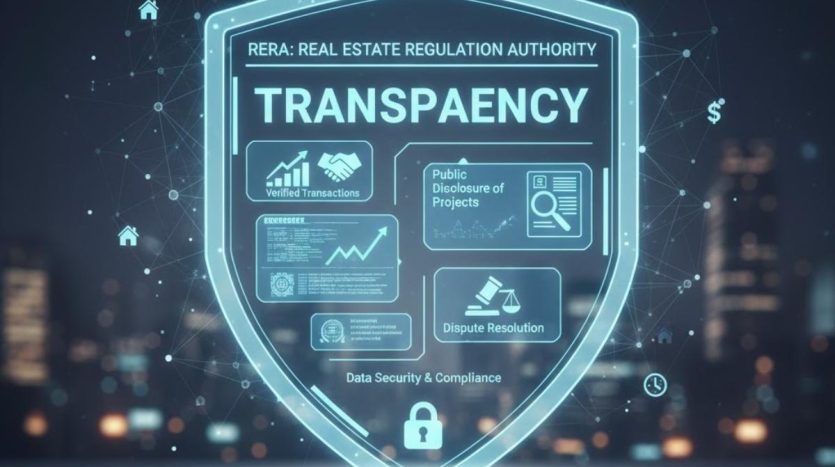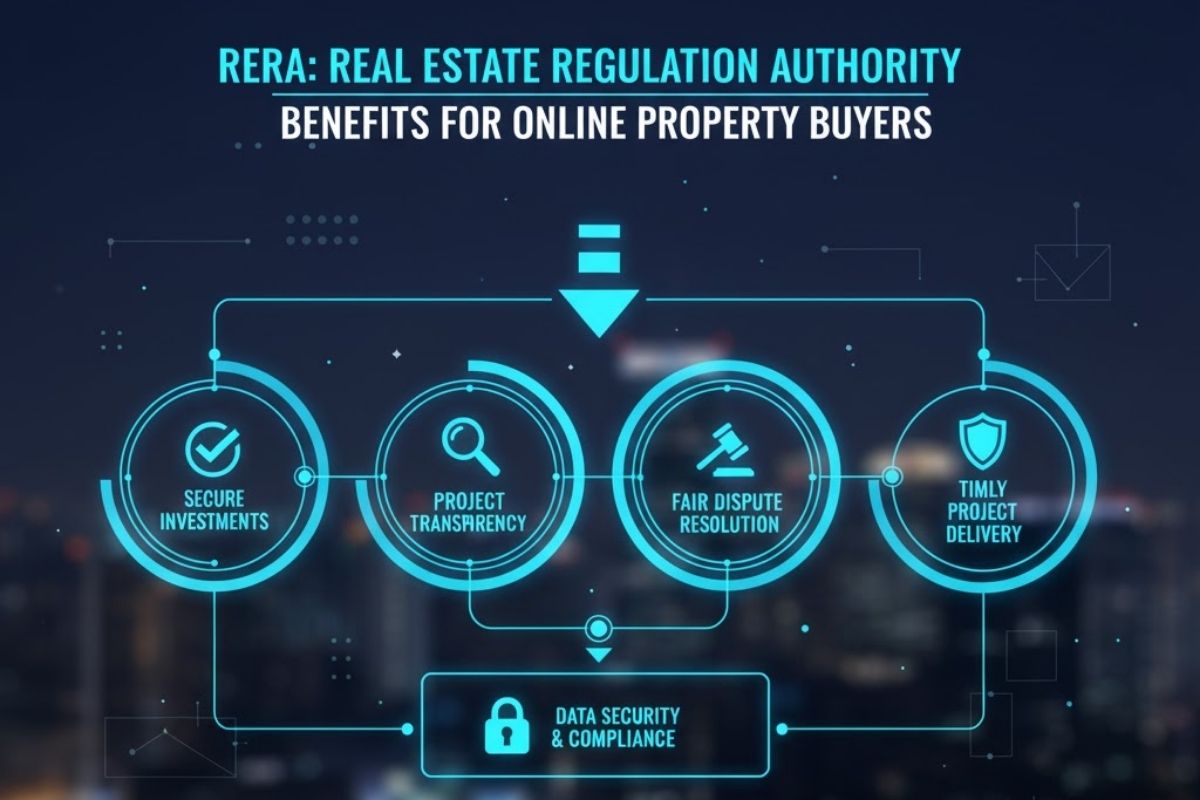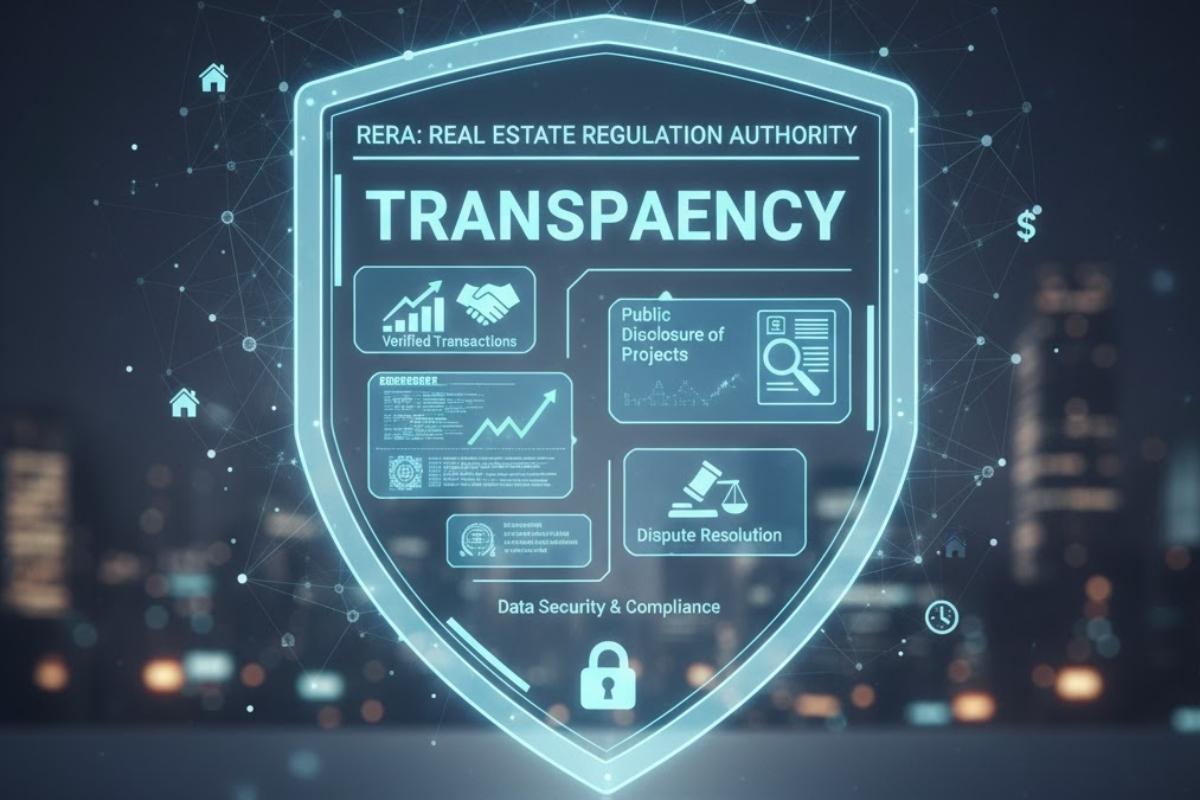How RERA Delivers Safety in Online Property Transactions
Introduction
Buying property online is fast, convenient, and more popular than ever, but it also comes with risks many people don’t see coming. In a time when online property transactions are becoming the norm, trust and transparency matter more than ever. That’s exactly where RERA steps in. Designed to protect buyers and bring accountability to the real estate sector, RERA plays a vital role in making your property journey smoother and safer. In this blog, you’ll discover how RERA delivers security in the digital real estate world, helping you make confident and informed decisions with every click.
Benefits of RERA for Online Property Buyers
Buying a property has always been a major milestone, and often a stressful one. But with digital technology, more and more people are turning to online property platforms to browse listings, compare prices, and even complete transactions. While this digital shift offers speed and convenience, it also brings challenges like fraud, delays, and a lack of transparency.
That’s exactly why RERA, the Real Estate (Regulation and Development) Act, is such a game-changer. Introduced in 2016, RERA was designed to bring accountability, transparency, and fairness to India’s real estate sector. And as property transactions continue moving online, the benefits of RERA are more relevant than ever for buyers.
Let’s explore how RERA protects and empowers online property buyers in today’s evolving digital landscape.
What Is RERA and Why Was It Introduced?
Before RERA, property buyers often found themselves at the mercy of developers. Delayed projects, vague agreements, hidden charges, and incomplete information were common.
To fix these issues, the government introduced RERA with a few clear goals:
- Protect buyers’ rights.
- Promote transparency in real estate deals.
- Hold developers accountable
- Provide faster resolution of disputes.
Today, RERA has transformed how developers operate and how buyers experience the property purchase process, especially online.
Why RERA Matters in Online Property Deals
With more people exploring online property listings, it’s easy to get drawn in by glossy ads, attractive prices, or unrealistic promises. But how can you be sure the project is real, approved, and legally compliant?
That’s where RERA steps in:
Verified Listings and Project Registration
RERA requires developers to register their projects before advertising or selling, whether offline or online. Once registered, the project details become publicly accessible on the state RERA website.
What this means for online buyers:
- You can verify if a property is registered before booking.
- Access key details like land status, approvals, timeline, and layout
- Avoid fake or misleading online property advertisements.
RERA ensures that only legally approved projects are promoted online, giving buyers peace of mind.
Standardised Sale Agreements
No more confusing contracts filled with loopholes. Under RERA, all developers must follow a standard agreement format that clearly outlines:
- Payment schedule
- Possession date
- Penalties for delays
- Project specifications
This helps online buyers understand their rights and obligations without needing a legal background.
Protection of Your Money
One of the biggest concerns for buyers is, “Where is my money going?”
RERA solves this by mandating that 70% of the money collected from buyers be deposited in a dedicated bank account.
Benefits for buyers:
- Prevents misuse of funds
- Reduces the risk of project delays
- Increases trust, especially in online property deals
Fast Dispute Resolution
Buying a property online doesn’t mean you’re on your own. If something goes wrong, like delays or false promises, you can file a complaint with the RERA authority.
- Each state has a Real Estate Regulatory Authority and Appellate Tribunal.
- Buyers can file complaints online.
- Cases are resolved much faster than traditional court systems.
This system gives buyers legal backing and recourse, even if their initial interaction was through an online portal.
Accountability of Developers and Agents
Under RERA, both developers and agents must register with the authority. They must also:
- Provide regular project updates.
- Stick to approved plans and deadlines.
- Avoid misleading advertisements
- Failing to follow these rules can result in penalties, project bans, or even imprisonment for repeat offenders.
For online property buyers, this builds confidence in the entire process from booking to possession.
Easy Access to Information via RERA Portals
Each state has its own RERA portal, which is accessible to the public. As a buyer, you can:
- Search for registered projects and developers.
- Check the status of construction.
- Read complaints filed against developers.
- Download legal documents and approvals.
This level of transparency makes buying a property online much safer and more informed.
Boosts Buyer Confidence and Market Credibility
By regulating the market, RERA builds buyer confidence and filters out unreliable developers. This has led to:
- More professional developers are entering the market
- Fairer competition
- Greater trust in online property platforms
Buyers can now make informed choices without worrying about hidden surprises.
The Rise of Online Property Transactions
The digital age has changed how we do almost everything, from shopping and banking to how we search for our dream home. One of the most exciting shifts in recent years has been the rise of online property transactions. Whether you’re a first-time buyer or an investor, browsing for property online has never been easier.
But while this digital convenience is great, it also comes with a fair share of risks. That’s where RERA (Real Estate Regulation and Development Act) steps in as a powerful safeguard. In this article, we’ll explore how online property transactions are shaping the future of real estate and how RERA is helping make them more secure and transparent.
What’s Driving the Rise of Online Property Transactions?
Today, a growing number of people are skipping traditional methods and turning to online property platforms to explore options, compare prices, take virtual tours, and even initiate bookings. And it’s not hard to see why.
Key reasons for the shift:
- Convenience: Browse hundreds of properties anytime, anywhere
- Faster decisions: Quick access to listings, images, reviews, and prices
- Wider reach: Look at properties outside your local area
- Virtual tools: 360° tours, online loan calculators, and more
- Paperless process: Digital documents and e-signatures streamline deals
This digital approach is particularly attractive to busy professionals, NRIs, and tech-savvy homebuyers. However, with every opportunity comes a challenge.
The Hidden Risks of Online Property Transactions
While online platforms make real estate more accessible, they also bring certain concerns:
- Fake listings or misleading photos
- Unverified builders or agents
- Delays in possession or project completion
- Legal and documentation errors
- Lack of clarity in the transaction process
These risks can lead to financial loss and emotional stress, especially if the buyer is unfamiliar with real estate laws.
How RERA Strengthens the Online Property Ecosystem
To solve many of these challenges, the Indian government introduced RERA in 2016. It aims to regulate the real estate sector, protect buyers, and ensure developers follow ethical business practices.
Even as property transactions move online, RERA continues to play a key role in:
- Making information accessible
- Holding developers accountable
- Speeding up dispute resolution
- Promoting fair practices
Let’s look at how RERA specifically supports online property buyers.
Ensures Verified Projects and Builders
Under RERA, all real estate projects above a certain size must be registered before being marketed or sold. This includes online property listings.
Benefits for online buyers:
- You can check if a property is RERA-approved on your state’s RERA portal.
- View builder credentials, project timelines, and legal approvals.
- Avoid scams or unregistered developers.
This is especially helpful when browsing unfamiliar projects or investing in a different city.
Standardised and Transparent Sale Agreements
RERA requires a standard format for sale agreements, eliminating hidden clauses or vague commitments.
As a buyer, you get:
- Clear possession dates
- Defined payment schedules
- Legal recourse in case of delays
So, even when you book a property online, you’re protected by a uniform legal framework.
Financial Safety for Buyers
With online transactions, one major concern is: “Where is my money going?”
RERA addresses this by requiring developers to deposit 70% of the buyer’s payments into a separate project account. This money can only be used for construction and land costs.
This ensures:
- No misuse of your funds
- Lower risk of stalled or abandoned projects
- Higher financial discipline among developers
Easy Complaint Filing and Fast Dispute Resolution
If you experience delays, poor service, or feel misled, RERA gives you the right to file a complaint online with your state’s RERA authority.
- Many cases are resolved faster than in traditional courts.
- You can claim interest, compensation, or refunds.
- All complaints are documented and visible on the portal.
This digital grievance system brings real accountability to online property dealings.
Access to Reliable Information
Each RERA portal provides a wealth of verified data:
- Registered builders and agents
- Project details, including size, status, and approvals
- Legal documents and complaint records
Before you even contact a seller, you can research the online property thoroughly. This saves time, reduces doubt, and builds trust in the process.
RERA and the Future of Digital Property Transactions
As more real estate activity shifts online, RERA is evolving too. Some state authorities now support:
- Online registration of projects
- Digital complaint tracking
- E-payment of stamp duty and registration fees
- Integration with other government portals for faster approvals
This digital-first approach ensures that RERA remains relevant and effective in the age of online property buying.
How RERA Ensures Transparency in Online Property Deals
In the digital age, the way people buy and sell property has changed dramatically. Thanks to technology, online property transactions are becoming the new normal. You can now browse listings, take virtual tours, compare prices, and even apply for home loans, all without stepping outside your home.
But while this convenience is a game-changer, it also brings new challenges. How do you know if the project is legal? Can you trust the promises made in an online ad? What if the developer doesn’t deliver on time?
RERA was introduced in 2016 to bring transparency, accountability, and fairness to the real estate market. And as the industry goes digital, RERA plays a key role in ensuring that online property deals are safe and trustworthy for buyers.
Let’s explore how RERA is transforming online real estate transactions and protecting your investment.
Why Transparency Matters in Online Property Deals
Before the introduction of RERA, buying a property, especially through online platforms, often meant taking a leap of faith. Many buyers faced issues like:
- False or misleading advertisements
- Delays in possession
- Hidden charges
- Unclear ownership or legal status
- Poor construction quality
As more people rely on online property listings to make big financial decisions, transparency has become more important than ever. RERA ensures that buyers get clear, verified, and accurate information before committing to a purchase.
Mandatory Registration of Projects and Developers
Under RERA, all residential and commercial real estate projects above a certain size must be registered with the state’s RERA authority before they are advertised or sold, online or offline.
Why this matters:
- You can check if a project is legally approved.
- Details like land status, layout plans, and timelines must be disclosed.
- Only registered developers can advertise and sell properties.
For buyers, this means you no longer have to rely solely on flashy brochures or websites. You can visit your state’s RERA portal to verify project and developer details yourself.
Full Disclosure of Project Information
Transparency begins with access to reliable information. RERA ensures that developers provide all essential details upfront, such as:
- Project layout and plan approvals
- Expected completion date
- Financial disclosures
- Status of land ownership
- Construction progress
When browsing an online property, you can now look beyond attractive photos and actually check whether the promises made are backed by legal documents.
Standardised Agreements for Fair Terms
Many buyers used to be caught off guard by vague contracts full of legal jargon or hidden clauses. RERA solves this with a standardised sale agreement format that includes:
- Possession timelines
- Payment schedules
- Penalties for delays
- Clauses protecting buyer rights
Even if you book a property online, you are now legally entitled to clear and balanced terms.
Protection of Buyer Payments
Another area where RERA brings transparency is in financial dealings. The law requires that 70% of the funds collected from buyers be deposited in a separate bank account, to be used only for that specific project.
This ensures:
- Developers don’t divert funds to other projects.
- Construction proceeds as planned
- Buyers are less likely to face project delays.
When buying a property online, this gives you confidence that your money is being used responsibly.
Quick Dispute Resolution
Online property transactions can sometimes lead to confusion or conflict. What happens if the possession is delayed or the developer doesn’t meet their commitments?
RERA gives you the right to:
- File complaints through the online RERA portal
- Have your case heard by a Real Estate Appellate Tribunal.
- Receive compensation or refunds where applicable.
This creates a fair and fast-track system to handle disputes, something that was sorely missing before RERA.
Online Portals for Verified Property Information
Every state now has its own RERA website that acts as a one-stop source of truth for online property buyers. These portals allow you to:
- Search for registered projects and developers.
- Download legal documents and approvals.
- Track the status of construction and complaints.
- Report any misconduct by agents or builders.
This level of transparency has completely changed the buyer experience, especially for those exploring property deals online.
How RERA Protects Buyers in Online Property Transactions
Buying a home or investing in property is one of the biggest financial decisions a person makes. In today’s digital world, more and more buyers are turning to websites and mobile apps to explore, evaluate, and even purchase online property. This trend offers convenience, speed, and easy access to multiple listings, but it also comes with its own set of risks.
Enter RERA, or the Real Estate (Regulation and Development) Act. Introduced in 2016, RERA was designed to bring order, transparency, and accountability to the real estate sector. With online property transactions becoming the norm, RERA plays a critical role in protecting buyers from fraud, delays, and legal confusion.
In this blog, we’ll break down exactly how RERA protects you when purchasing a property online, and why it’s important to ensure your next real estate investment is RERA-compliant.
Why Online Property Transactions Need Protection
Digital platforms make it easy to browse properties, compare prices, and even book a flat online. However, this convenience can sometimes come at a cost:
- Misleading advertisements
- Fake listings or unverified projects
- Delayed construction or possession
- Unclear legal documentation
- Lack of accountability from builders
Without face-to-face interactions, buyers may feel uncertain. This is where RERA steps in and builds trust into the online buying experience.
Mandatory Project Registration
RERA mandates that all residential and commercial real estate projects above a certain size must be registered with the respective state authority before advertising or selling, even on online property portals.
How this helps:
- You can verify whether the property you’re viewing online is legally approved.
- Details like land ownership, project layout, and delivery timeline are disclosed.
- Builders can’t promote incomplete or illegal projects.
So the next time you browse an online property, check its RERA registration number. This simple step can protect you from a lot of trouble later.
Full Disclosure of Project Information
One of RERA’s biggest strengths is transparency. Builders are legally required to provide complete details about their projects, including:
- Project plan and location approvals
- Project status and timelines
- Financial disclosures
- Construction progress updates
This means you’re no longer relying solely on marketing brochures or edited images. You can get real information about the property from RERA portals before making a decision.
Standardised Sale Agreements
Have you ever felt overwhelmed reading a property agreement full of legal jargon and hidden conditions?
Under RERA, developers must follow a standard format for sale agreements. This ensures:
- Fair terms and clear possession timelines
- Clearly defined penalties for delay
- Protection against arbitrary cancellation clauses
This gives online buyers more control and clarity when reviewing contracts, even digitally.
Financial Safeguards for Buyers
RERA has strict rules about how developers use the money they collect from buyers. Builders must deposit 70% of buyer funds into a separate bank account to be used only for that specific project.
Why this matters:
- Reduces the chances of delays due to fund mismanagement
- Ensures your payment supports the property you’re buying
- Adds financial discipline to the development process
This is a major win for online property buyers who may never meet the builder in person.
Quick Complaint Resolution
RERA gives you the legal power to hold builders accountable, even if your deal started online.
- Buyers can file complaints digitally through the RERA website.
- State authorities have Real Estate Regulatory Tribunals for speedy resolution.
- Buyers can claim compensation for delays or broken promises.
This legal support brings confidence to online buyers, knowing they have a clear path for justice if something goes wrong.
Accountability for Agents and Builders
RERA doesn’t just regulate projects, it also monitors agents and developers. All real estate agents must register under RERA and follow ethical practices.
- Misleading advertisements can result in penalties.
- Builders must update project details regularly.
- False commitments can lead to legal action.
This makes the online property ecosystem much safer and more reliable.
Easy Access to Verified Data via RERA Portals
Each state has its own RERA portal where you can:
- Search for registered property projects.
- Check developer credentials and track records.
- Review approvals, complaints, and legal documents.
This means buyers have the power to do their own research and make informed decisions, right from their smartphones.
Conclusion
Peace of mind is priceless when it comes to buying property, especially in the digital world of online transactions. As online property deals continue to grow, so does the need for trust, transparency, and protection. From ensuring project credibility to safeguarding your investment, RERA creates a safer space for every property buyer navigating the online market. If you’re planning to explore or invest in online property, understanding how RERA works is your first step toward making smarter, more secure decisions.
Have questions or exploring a multi-owner investment? Contact us, we’re here to help you every step of the way.
Frequently Asked Questions
Q1: What is the main role of RERA in real estate?
Ans. RERA ensures transparency, accountability, and timely delivery in property projects.
Q2: Can I verify a property online using RERA portals?
Ans. Yes, RERA portals allow you to check approved online property listings and developer details.
Q3: How does RERA protect online property buyers?
Ans. RERA mandates disclosures, legal safeguards, and standardised sale agreements.
Q4: What if a developer violates RERA rules?
Ans. They face penalties, suspension, or legal action.
Q5: Is RERA applicable to resale properties?
Ans. RERA mainly covers new projects, but verification still adds value.









